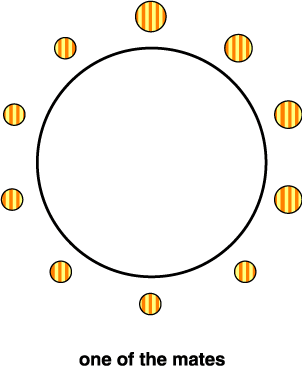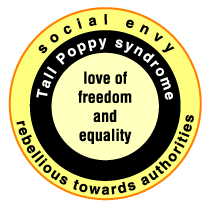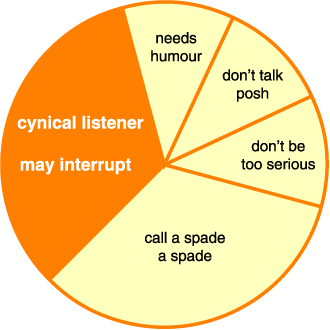Culture: interactionConcept of statusAustralians are among the most democratic people in the world and any display of status symbols is risky. They love to cut people down in size. Status is obtained by prowess in sport and often in politics by championing the “battler”. Rich people such as Kerry Packer and Alan Bond are admired for their achievements, but often criticised for being too powerful. Convict ancestry (becoming increasingly rare) is in fact a sign of status today!
Gender issuesThough women are able to make their mark in business and politics, it is not so long ago that they were to some extent abused on the social scene. Australian males tend to assume a certain air of machismo in pubs and at parties and it was a custom for men to drink in a circle, with their wives and girlfriends revolving round the periphery or sitting apart at a table. This male attitude has softened considerably since the change in the drinking laws. Even today, however, women are shown less deference in pubs and clubs than other Anglo-Saxon females.
Leadership styleAustralian managers, like Swedes, must sit in the ring with the “mates”. From this position, once it is accepted that they will not pull rank, they actually exert much more influence than their Swedish counterparts, as the semi-Americanized nature of Australian business requires quick thinking and rapid decision-making.
 Language of management
Language of managementAustralian English is young, vibrant, inventive, humorous, cynical, irreverent, classless, human, original, often teetering between erudite and vulgar - in short a revealing reflection of the “battling” Australian character. As such it is the key to how Australians may be motivated. Australian managers would be ineffective with American pep talk English. (Australians would respond cynically). British or Canadian English, on the other hand, would be too prim or too laid back. The Aussies want their boss to join them in a healthy respect for rules and formalism, to lapse into broad speech and cuss a bit, to be affable and ironic at the same time, to avoid flowery or obscure expressions - finally, to call a spade a spade.
 Motivation factors
Motivation factors Show you are willing to be “one of the mates”.
While remaining law-abiding, show a healthy disrespect for many laws and too much government interference.
Cut through red tape at every opportunity.
Always lead from the front and never ask anyone to do anything you would not do yourself.
Roll up your sleeves and help people to move tables.
Avoid giving brusque orders or any other form of arrogance.
Develop deep friendships whenever this is appropriate.
Broad speech is acceptable and popular at all levels of society. Moderate swearing is not taboo.
Sarcasm and irony are popular, but when exercising them, let kindness shine through.
Australians love informality. Never criticize anyone for not dressing smartly or for failing to observe etiquette.
Praise Australia - there is no reason why you shouldn't!
They are free spenders, so be careful not to appear stingy.
The “tall poppy syndrome” is a reality. Ride too high and the Australians will soon cut you down.
Australians like cheerfulness and affability. Respond accordingly.
Be prepared to chat amiably with relative strangers. Australians have developed strategies for making friends quickly.
Get a feel for how Australian males treat women. It is a rather special relationship.
Give parties regularly if this is appropriate. Australians often mix business with social activities.
One can make good progress with Australians if one lets one's hair down while drinking and socializing.
Australians often appear irreverent, but one should take their irony with a pinch of salt. Many rough-and-ready Australians have a heart of gold.
Do them favours. They are quick to repay.
Jokes and anecdotes are very popular. A sense of humour is essential for getting the best out of Australians.
They possess work ethic, but are extremely jealous of their leisure time. At 4 or 5 o'clock they are usually thinking about the pub or the beach. Do not thwart them in this area.
Always bear in mind that human rights are high on their list of priorities.
Avoid flowery or obscure speech. Call a spade a spade.
General behaviour at meetingsAustralian meetings are in the main relatively informal affairs, beginning with cups of tea and first names and ending in compromise where everyone feels he/she has taken away something. In between, exchanges can be lively, blunt, cynical, even aggressive, though in general the participants are looking for solutions. With foreigners, Australians make efforts to curb their national irreverence for superiors and institutions.
 Negotiating characteristics
Negotiating characteristics Australians are keen on doing business - well aware of the importance of developing trade and commerce for their isolated and under-developed island.
Consequently they have a tendency to facilitate deals for partners rather than adopt a tight-fisted attitude.
Meetings therefore begin in a friendly, jocular atmosphere.
Outlining the deal and exploring the possibilities are the first steps.
“Do we have a deal?”
Australian side makes frank proposal.
If resistance is met, some cynicism may creep in, but is generally jocular.
Frankness (and possibly some creative cheekiness) on both sides is the next step.
Compromise is sought.
Friendly conclusions.
An Australian as a member of an international team
Leslie PerkinsAustralians feature more and more as members in international teams, in Britain and Europe, in the USA, and increasingly in Asia. Leslie Perkins, from Sydney, is a huge asset to his team, as most of his fellow nationals are.
Roaming the world, Australians bring refreshingly new per¬spectives to multinational gatherings. Semi-Americanized, they are noted for quick thinking and rapid decisions (to which they add a creative cheekiness all of their own). Conversation is cheer¬ful, always lively and unpredictable, as there is no manual for correct social or business behavior in Australia. Australian speech – a fascinating, inventive, adventurous variety of English – is charac¬terized by humorous directness and absence of any inhibitions. It is informal and “matey,” and has cute, Aussie words and expres¬sions (digger, dingo, heart starter), all irresistible in a young, class¬less society. Leslie is generous and hospitable, essentially sociable, tolerant of others’ ideas, and fond of compromise. Habitually a protector of the underdog (the “battler”), he eschews all forms of arrogance and wants a “fair go for all.” He has the courage of his convictions and is unafraid of innovation or risk – Australians love to gamble.
Leslie lacks the international polish of a Dane or a Swede; he is better described as a rough diamond. As such, he is at his best when managed, since, as is the case with Americans, he is blind to some of the intricacies and subtleties of many European and Asian cultures. He is popular with other English speakers. Americans recognize in him their own traits of frankness and daring; Canadians sympa¬thize with his half but not full Americanization; with the English, South Africans, and New Zealanders he has cricket and rugby to talk about. Germans, however, are shocked by his irreverence to authority. Leslie is polite to the team leader but says what he thinks. An Australian is often uncomfortable in hierarchical situa¬tions. A British or Nordic chair will give him a lot of rope; French or German team leaders may not know what to make of him. Leslie might contradict a colleague openly, then laugh about it and follow it with a vague Australianism: “No worries, she’ll be all right in the end.” This occasional laisser-faire attitude causes less of a problem than the “tall poppy syndrome,” which is an Australian cultural black hole (more on this in Chapter 11). This enduring national trait harks back to the convict transports when to rise above your mates or associate with hierarchy would damn you in the eyes of your peers. Modern Australians will discard their normal conge¬niality at the drop of a hat if anyone on the team shows any sign of adopting a superior attitude or pulling rank. On such occasions Australian cynicism reveals itself markedly, sometimes accompa¬nied by profanity. Swedish and Swiss colleagues – disciples of cor¬rectness – may be dismayed, though human-rights-obsessed Danes will approve entirely.
All in all, Australians are fun and add spice to a multinational group. The team leader must adopt a rough-and-ready approach, use first names, avoid big or obscure words, flowery speech, or innuendo, and call a spade a spade. Leslie dislikes too serious or complicated discourse – he hates unnecessary padding or pleasantries. Status sym¬bols are out, pulling rank is out, and a personal touch is essential. Australians like leaders to cuss a bit (difficult for Swedes); it adds to the mateyness they crave. Their inborn sense of irony and perspicac¬ity enable Australians to home in on cheating or false premises. In a land of many sheep, you cannot pull the wool over their eyes.
Contracts and commitmentsAustralians have the standard Anglo-Saxon view of contracts, i.e. they must be adhered to. They pride themselves on their speed, both in drawing up agreements and implementation afterwards. When things go wrong, however, they can demonstrate more flexibility than Americans and British, as they are anxious to maintain business anywhere they can. Their experience with Asians has taught them that re-negotiation of the terms of a contract may occasionally be of benefit.
Manners and taboosIt is quite common for Australian men to refer to each other as “mate”, even at the first meeting. Women are often called “love” though not in business environments. “Fair go” is also central to the Australian outlook, based on common sense, equality and a healthy disregard for authority and ideology. This is why Australians always sympathise with the “battler” and underdog. They don't like the exercise of power and privilege over the weak. The two deadly sins are “scabbing” and “dobbing” - informing against one’s mates.
There is no manual for correct behaviour in Australia, as the country lacks a clearly defined social and conversational map. Most Australians see this as a strength, a licence to be either erudite or rude in any situation. This keeps conversation lively, no one knowing what twist or turn it is likely to take. Will it end up a torrent of abuse, or warm bonhomie and sensitive human exchange, or none of these? While not entirely true, egalitarianism is a cherished myth and the foreigner must always be very careful not to threaten this notion when talking to an Australian from any background. This egalitarianism is based on the idea of a classless society in which everyone is treated equally - regardless of wealth, education or background. Working from this "fair go" premise, conversation will be easier, but still fraught with traps. In many countries accent and education will tell you a lot about a person. Not in Australia! The political map has also become very blurred The longest surviving political party is the Australian Labour Party (ALP) which grew out of the trade union movement. Traditionally, the ALP and its supporters have been pro-worker, social welfare and a genuine "fair go" for the underdog. It was also, until the early 1970s, very isolationist and anti-Asian. Many Labour supporters are very upwardly mobile middle-class professionals living in the most prestigious suburbs of the major cities. They share their political party with single parents and day labourers.
How to empathize with themAlthough the basic fabric of Australian society is complex yet appears deceptively simple, there are certain subjects that are in general "safe" or “dangerous”. All sport is generally safe and most Australians respond well to a sporting analogy.
They love criticising themselves, but take very poorly to being criticised. This makes it very difficult for you as the newcomer because you will often find yourself in the middle of torrid condemnation of Australia or Australians, but should you agree too enthusiastically or even mildly, you run the risk of being dubbed a “whinger” (complainer). This could lead to your own country being very negatively compared to Australia. If you persist, you could be told in a variety of ways to “go back where you came from”. But Australians also do not like or trust people who constantly or too enthusiastically praise them. They suspect that they are being set up to be either humiliated or deceived. Too much praise raises expectation and puts the high achiever under insufferable pressure - and Australians hate being pressured. When the Australian cricket team won the coveted Ashes from their arch-rival England, the Captain's first response to being congratulated was not of joy but almost of regret. “Now everyone will expect us to play as well next time. It has put a pressure on the whole team”, he lamented to a long-faced Australian interviewer.
This tortured form of modesty is greatly respected by most Australians and if it is not observed by the successful they will rapidly fall victim to the “tall poppy syndrome”. Equally, never take yourself or your national symbols too seriously, or a similar fate will befall you. It is a source of great pride to Australians that the Prime Minister is frequently booed at public appearances and that quite a few Australians do not know the words of the national anthem.
Perhaps the greatest strength of the Australian personality, although it is under threat, is their monumental cynicism. Australians are totally cynical of people in power or with too much wealth, respecting the little person, “the battler”, rather than the winner. If you keep this in mind and don't oversell yourself or undersell your Australian hosts, success, friendship and good times will be yours down under.









